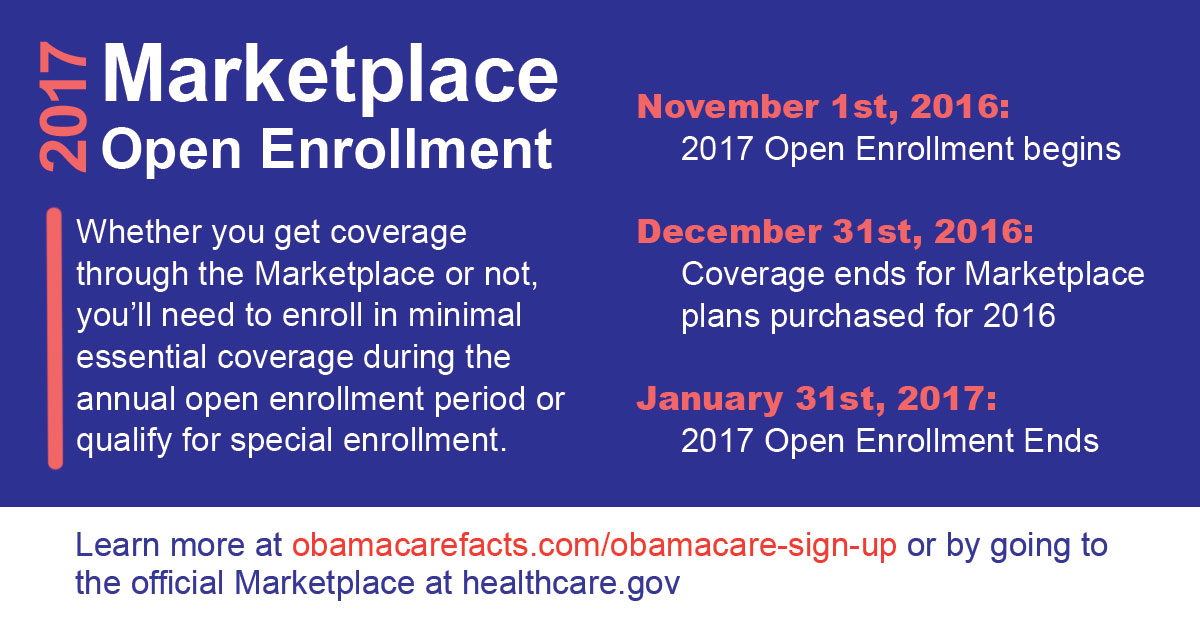ObamaCare Open Enrollment 2017








Understanding ObamaCare’s 2017 Open Enrollment Period
Open Enrollment 2017 started November 1, 2016 and ended January 31, 2017. Open enrollment is the only time you can enroll in a health plan on the individual market without qualifying for special enrollment. That means if you wanted to get cost assistance and avoid the monthly fee for 2017, you needed to get a plan between Nov. 1, 2016 – and Jan. 31, 2017.
TIP: Open enrollment for 2018 will run from November 1, 2017 – January 31, 2018. Learn about open enrollment 2018.
- To stay covered you need to maintain the plan, or an exemption, for each month of the year.
- Insurance purchased before the 15th of each month starts on the 1st of the next month. If you enroll after the 15th, your coverage won’t start until the month after.
- Given the above, you needed to enroll by December 15th, 2016 to have a plan that started by January 1st, 2017.
- If you enrolled for 2017 coverage in January, you had a gap in coverage. That said, everyone is allowed a short coverage gap of fewer than three months each year (meaning as long as you enroll by January 31st, you are safe).
- If you missed open enrollment, your only options are Short Term Health Insurance, employer-based coverage, Medicaid, and CHIP. Those who miss open enrollment may find themselves with no other options and may end up owing the fee.
- Medicare has a unique open enrollment period as well. If you qualify for Medicare, you don’t have to worry about ObamaCare for yourself (although you are still responsible for ensuring your tax family gets covered if you are the head-of-household). Learn more about ObamaCare and Medicare.
- Moving forward, all of this is subject to change per the terms of a repeal and replacement plan.
- You can learn all about open enrollment here. Learn more about what to do if you miss the deadline here. See our main ObamaCareFacts page for more details.
TIP: If you qualify for cost assistance, think carefully about how much you take upfront in Advanced Premium Tax Credits. Cost assistance is based on household income and family size as compared to the Federal Poverty Level. If you project your income too high, you may end up owing back tax credits via form 8962 at tax time (this is especially true if you or a tax filer in your household gains or loses income). Medicaid and out-of-pocket assistance don’t require repayment.
TIP: It is advised that those looking for coverage shop on their state’s official marketplace or HealthCare.gov (in states that use the federal marketplace). This will ensure shoppers know all their options regarding cost assistance and get a major medical plan that counts as minimum essential coverage. Shoppers can also contact an online or in-person broker (like the ones featured on our site) for help selecting a marketplace health plan or off-marketplace plan. In some cases, shoppers can also go directly to an insurer although this may require going directly to an insurer’s office, as insurers are encouraging shoppers to use the exchange. Learn more about shopping for private health plans outside the marketplace.
TIP: See also 2017 maximums and deductibles and 2017 HSA info for plans held in 2017 (plans you buy during this 2017 open enrollment which started Nov. 1, 2016). An HSA is an amazing way to save tax dollars for those who can manage to fund them.
BOTTOM LINE: Start your journey at HealthCare.gov and make sure you are not only signed up but enrolled, in a plan by December 15th, 2016. We suggest paying careful attention to cost sharing and networks. When in doubt, a Silver Plan that qualifies for an HSA is typically a safe bet. Get more tips for shopping for getting the best health plan.